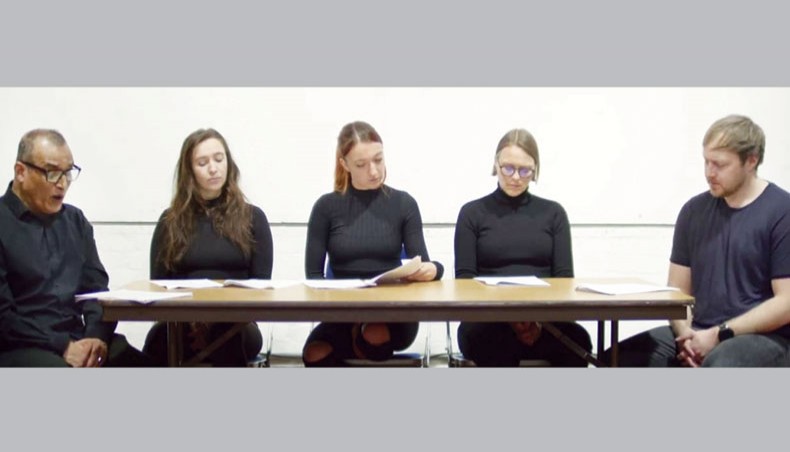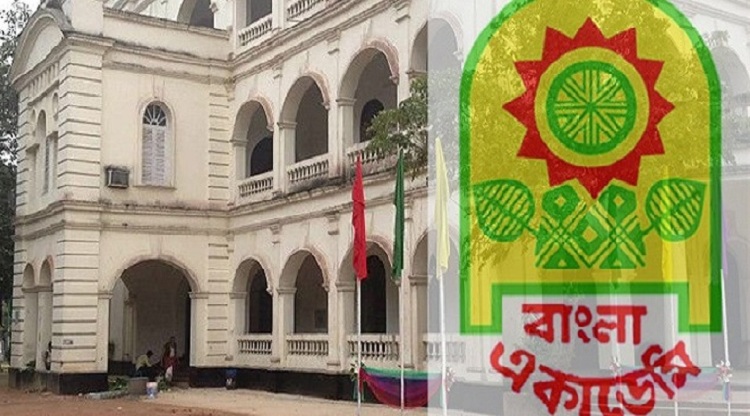Bangla Academy Award-winning playwright Sadhana Ahmed’s acclaimed play titled Maatbring was performed at the ongoing…

Sadhana Ahmed: A benchmark of the theatre industry
My heartiest congratulations, that your drama ‘Maatbring’ has been selected to be staged in the 8th Theatre Olympics 2018 in India. What made you enter the theatre industry?
Thank you very much! To be frank, I did not plan to be a part of the theatre industry. Basically, I was connected with cultural activities since childhood. Being an active member of ‘Khelaghar’, I used to recite poetry and watch dramas. This attachment in some means can be considered as a grip towards this venture. In 1997, I started writing a television drama. That was my first step of becoming a playwright.
Initially, I used to write only for television. Later on, I started writing for theatre.
What was the name of your first drama? Share something about your initial days?
Well, the name of the drama was Nirobe Nibhrite. My friends greatly appreciated that one. Then, one of the producers of Bangladesh Television invited me to work on package dramas. Afterwards, I wrote a telefilm called ‘Char Suborno’ in 1997. Renowned actors such as Pijush Bandyopadhyay acted in that. He was fascinated after reading the script and said, “Your hand is for writing theatre dramas, Sadhana! Just a bit of practice and you will fly.” His words inspired me. Then, I directed several advertisements and television dramas. In those days, I worked with the legendary Humayun Faridi also as a director. The appreciation I got from such people moved me deeply. And, I decide to step forward to the theatre industry.
When did you start your career in theatre? Was your first show as a director or an actor?
This is an interesting fact that I actually started my theatre career as an actor. Though I was connected to the theatre since 1996, it was in 1998 when I first performed on stage at Sisir Mancha, Kolkata. The name of that comedy play was ‘Khamakha Khamakha’. One point to mention here is — I have never directed stage dramas. I only directed visual dramas on television.
Speaking of stage drama, tell us about Theatre Olympics and your drama ‘Maatbring’.
Precisely, Theatre Olympics is a platform for theatrical exchange throughout the world. They select nominal dramas of theatre practitioners and display those in the festival. This year, the Olympics is in India. Eight dramas from Bangladesh are selected to be staged there. Among them, ‘Maatbring’ is one. This drama is about the tribal people and their life — more specifically, the Garo community of our country. Through this ethnic group of people, I tried to portray the entire oppressed minority across the world.
What are your current writing projects?
Right now I am working on ‘Gang Kumaree’ in the context of Bhairab, Bangladesh, and hoping to finish it soon this year. Well, about the other plays — I have written ten plays so far. I would like to mention one, in particular, named ‘Saptaparni’. It is being staged in Kolkata since the January of 2017. The specialty of this drama is — seven directors direct it and seven female protagonists of Rabindranath Tagore come together to compliment the title itself. One of the actresses in this play is the legend, Maya Ghosh.
As you are working with theatre for a long time, how would you compare the previous and present situation of the industry?
According to my, the intense commitment and dedication that we had towards theatre do not exist anymore. That prominence is lost somewhere. There are solid reasons for this misfortune though. Capitalism and the virtual world cannot grasp the culture in our time. We used to consider theatre a ‘holy’ place. We learned manners and etiquette for years. It was impossible to even think about performing on stage before spending two years working behind the scenes. This kind of worshipping hardly exists in today’s theatre. I would not accuse the artists of this. The consumer society is the main reason behind this unpleasant truth.
What do you think about the trend of cultural adaptation in drama or film?
I have to admit that it is an amazing approach to merging different cultures. By this, we can represent our culture on a wide range. When Shakespeare’s Hamlet was adapted in our Bengali drama Darpan in the context of our country, I could instantly relate to that. It was magic.
This trend of adaptation should be seriously appreciated to elevate our thousand years of heritage and culture. I want to add, that I dream to see the next generation take up theatre as their passion, not an only profession. If this happens, it would be a lifetime achievement.
Financially, the theatre industry is in crisis. Do you feel the same? If yes, then how financial progress can be brought to this sector?
Of course, the financial crisis is a huge barrier in the theatre industry of Bangladesh. Sadly, our young artists cannot make their living out of their talents in theatre. Who could I accuse of the situation? Survival is the major issue. People are no longer interested in theatre for this crisis. Speaking about the financial progress, just think about our National Cricket Team. Patronization from the government brought a drastic change in this. If a little attention can be put in theatres, then I believe we can rise. The corporate sector can help us in this crisis. All the companies can donate a certain amount of money from their profit for theatre. After all, culture symbolizes the existence of a nation.
[Originally published in the Bangladesh Observer on March 15, 2018. Please follow the link to read the original content.]


